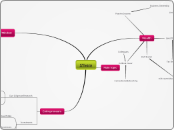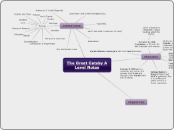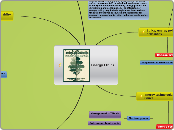Daisy
It's the smaller details of Daisy that make her complicated
Lifestyles of the rich
Emotions are not as important as how you look and what
people think of you
Nobody including Daisy showed up to Gatsby's funeral
because they were only actually interested in his wealth
and extravagant parties
Daisy is not permitted to marry Gatsby due to
him not being wealthy enough and having a
lower social status
Daisy, and many other wealthy women living in the 1920's
were not employed
This caused them to have no purpose during the day
and they didn't know what to do with themselves
They had no need to become more rich than they
already were
Materialism and Consumption in the novel demonstrates
how the rich believed that money CAN buy you happiness
Daisy wants to giver her pearls back to Tom
right before the wedding because she doesn't
want to get married
Tom gives Daisy pearls before their wedding to
show his love for her
Gatsby tours Daisy around his house and she
is impressed by the extravagance.
is
Gatsby goes and earns money in hopes that
he will be able to impress Daisy enough for her
to want to be with him again
Symbols:
- The green light at the end of Daisy's dock could symbolize hope since "Gatsby believed in the green light
- "Her voice is full of money"
Music
Singing/Instruments
Chicago is the main hub for Jazz music
Tom and Daisy were socially kicked out of Chicago for some reason not provided to the audience.
Some music was still very romantic and dramatic.
"A celebrated tenor had sung in Italian, and a notorious contralto had sung in jazz." (pg.46)
“Daisy began to sing with the music in a husky, rhythmic whisper, bringing out a meaning in each word that it had never had before and would never have again. When the melody rose, her voice broke up sweetly, following it, in a way contralto voices have, and each change tipped out a little of her warm human magic upon the air.” (pg. 108)
“Three O’Clock in the Morning, a neat, sad little waltz of that year, was drifting out the open door.”(pg. 108)
“In the music-room… Klipspringer had played The Love Nest.”
https://www.youtube.com/watch?v=kgm6xrdLiqg ← actual song. <- the actual song called 'The Love Nest'.
Musicians usually presented in bands of 8-12 piece bands.
“By seven o’clock the orchestra has arrived, no thin five-piece affair, but a whole pitful of oboes and trombones and saxophones and viols and cornets and piccolos, and low and high drums.” (pg. 40)
“ ‘Ladies and gentlemen,’ he cried. ‘At the request of Mr.Gatsby wer are giong to play for you Mr.Vladimir Tostoff’s latest work… Jazz History of the World.”(pg.49)
“The boom of a bass drum, and the voice of the orchestra leader rang out suddenly above the echolalia of the garden” (pg. 49)
The "Dance age"
Dances such as the Charleston, the Black Bottom, the Peabody, the Turkey Trot, and more, were extremely popular!
“Daisy and Gatsby danced. I remember being surprised by his graceful, conservative fox-trot - I had never seen him dance before.”(pg.105)
"A pair of stage twins, who turned out to be the girls in yellow, did a baby act in costume”(pg.46)
“There was dancing now on the canvas in the garden; old men pushing young girls backward in eternal graceless circles, superior couples holding each other torturously, fashionably, and keeping in the corners - and a great number of single girls dancing individualistically or relieving the orchestra for a moment of the burden of the banjo or the tarps."(pg.46)
Car industry
The boom of the car industry also allowed for new possibilities such as commuting to work or going to faraway places. At the same time, problems such as traffic jams and accidents were also beginning to be experienced
After coming back from France, Mr. Gatsby went back to "the out-of-the-way places to which they had driven in [Daisy's] white car."
Mr. Gatsby explains how the accident happened: "Well, first Daisy turned away from the woman toward the other car, and then she lost her nerve and turned back."
With changes happening in the car industry, other industries also began to emerge or expand, such as gas stations, motels, diners, etc
There was a variety of makes such as the Model T Ford, Model A Ford, Rolls Royce, or Daisy's "little white roadster"
Increasingly affordable due to lower costs and higher wages
Fashion
Daisy’s character oozes femininity which can be represented through sweet, fingerless lace gloves. She is able to charm her way through her life which can relate to why she wanted her child to be “beautiful and [dumb]” as her looks will carry her through her life. That will be her “strength”. So she does this through her high end fashion with coordinated outfits
Daisy attends Gatsby’s lavish party in a bejeweled dress. Dancing with him during the evening, she finds out that the party was set for her. Gatsby asks her how the party is and she responds with “perfect”
1. "Golden Girl"
2. "A breathless warmth flowed from her, a promise that there was no one else in the world she so wanted to see"
Subtopic
She is surrounded by finer things in life so she is in possession of fine jeweler, like a lilac fur collar
She is seen as the woman that is desired by men and by women, in terms of wanting to be her
Flapper Girl (Aka.Garçonne)
Rolled down stockings just below the knee. This way, people can see some flesh when you dance
Hats, headpieces or headbands on top of short, shiny hair
Shoes that have a tap dance look: round noses and a medium heel. E.g. Mary Jane shoes
Ivory skin, dramatic eyebrows and blushed cheeks
Dark, bee stung lips and heavy eye make-up
Hair got shorter: flappers loved the bob cut or the even shorter Eton crop
V-shaped dresses on the front and on the back
Hems of skirts started to rise: right below the knee
Waist dropped to the hipline









